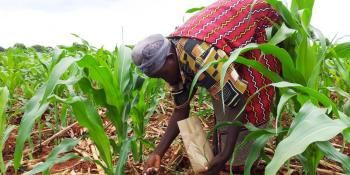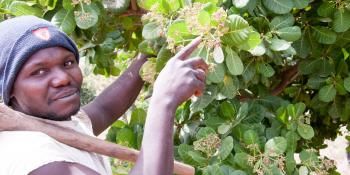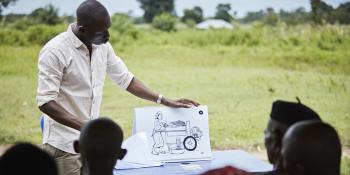Scaling climate-smart agriculture: Linking participatory action research to social learning

Participatory Action Research is a collaborative approach to research, education and action, and helps gather information in order to solve social or environmental issues.
Participatory Action Research (PAR) is a powerful approach to plan, act, reflect on and evaluate options along with farmers and other stakeholders in the context of climate change. However, its contribution to scaling climate-smart agricultural solutions may fall short if it isn't effectively connected with the existing social learning methods in farming communities. In this research highlight, we discuss how scaling needs to happen through community activities and social learning, rather than through program activities of intervening organizations.
The occasional paper titled "Towards developing scalable climate-smart village models: approach and lessons learnt from pilot research in West Africa", developed by the World Agroforestry (ICRAF) and partners, such as the International Union for Conservation of Nature (IUCN) and the Burkina Faso National Institute for Environment and Agriculture, discusses the Participatory Action Research approach. The paper details how the methodological approach evolves from the TOP-SECAC approach towards the Collaborative and Conversation learning method in order to ensure a more efficient upscaling.
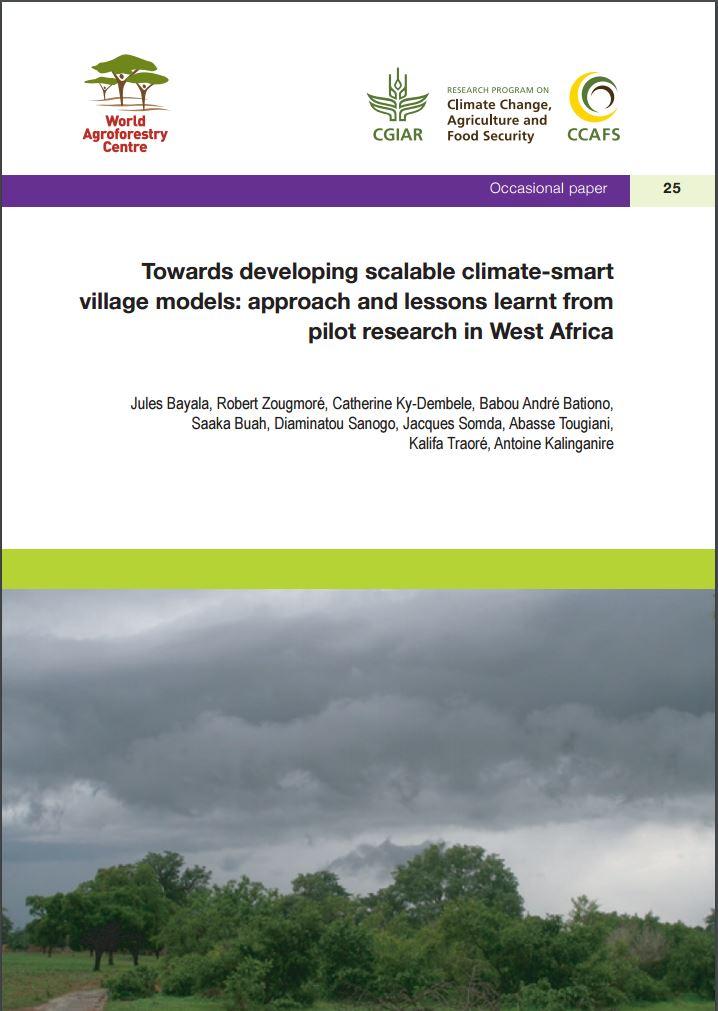
By choosing to promote the right social learning methods, the CGIAR Research Program on Climate Change, Agriculture and Food Security (CCAFS) can help nurture the scaling potentials of climate-smart agriculture. This research highlight has been produced based on gender-focused group interviews and discussions with agricultural extension officers in Burkina Faso and Ghana.
Identifying the right social learning methods for a community
In the CCAFS intervention communities in Burkina Faso and Ghana, farmers use several social learning methods to improve agricultural production in the context of climate change. The most prominent method includes the Conversation and the Collaborative learnings (see figure below for more details) that is implemented using the information received from CCAFS' Climate-Smart Villages and from other interveners.
The Conversation learning is the most used and effective method for peer-to-peer learning. During the Conversation, farmers contemplate the purpose of program-led activities, reflect on and challenge their thinking, and interpret and understand the often unfamiliar language received from programs. Such discussions can be categorised as endogenous learning method. By providing a space for farmers to ask powerful questions, Conversation learning helps them refine goals, share feedback, and generate successful outcomes.
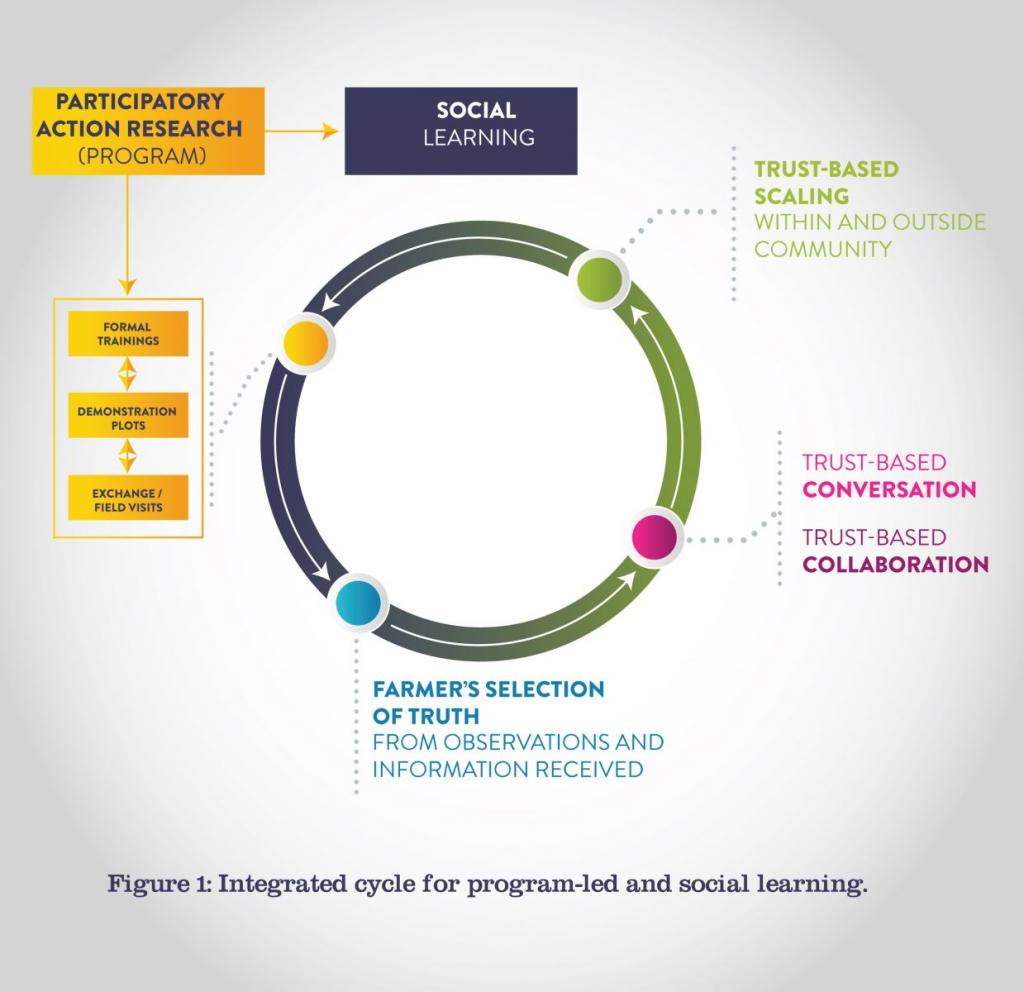 Figure 1: Integrated cycle for program-led and social learning. Design: J. Somda (IUCN), B. Bagayoko (CCAFS West Africa)
Figure 1: Integrated cycle for program-led and social learning. Design: J. Somda (IUCN), B. Bagayoko (CCAFS West Africa)
The Collaborative learning method involves groups of farmers working together in their farms to help each other in various tasks. It provides farmers with a space to observe what and how their peers have implemented agricultural technologies and practices. It therefore contributes to developing evidence on some improved practices and motivates for their replication.
In Ghana, Collaborative learning took place in the Village Saving and Loan Associations, where men and women farmers organize farm work and share financial resources to achieve goals in several activities, including agriculture. In Burkina Faso, farmers organize themselves into working groups in order to provide workforce to each other, and are exposed to diverse viewpoints of farmers with different farming backgrounds.
Trust is key for successful social learning
The use of the above social learning methods depends on the level of trust farmers have in their peers. Both men and women in the CCFAS intervention communities in Burkina Faso and Ghana stressed that point. While program designers and implementers regard technical knowledge and engagement as the most important criteria for identifying a model farmer, the communities considered truthfulness as key to engaging in social learning with their peers. Thus, a knowledgeable and engaged farmer with external interveners who isn't considered in his (her) community as truthful, will fail in motivating or engaging other farmers to enter into a learning process.
By referring to trustful persons as entry points for successful social learning, farmers mentioned values such as social norms that govern the life within their communities. A truthful person is therefore an individual who is more knowledgeable of and practicing these social values and norms than the others are. A truthful person is a model farmer from the farmers’ perspective.“
Jacques Somda, scientist at International Union for Conservation of Nature (IUCN)
The advantages and framework of social learning to scaling climate-smart agriculture
First of all, social learning supports continuous and on-demand training, with minimum disturbance to farmers’ daily workflow. Secondly, social learning is based on peer-to-peer approach, hence helps individual farmers feel being part of a group of farmers. Thirdly, social learning is cost-effective for CCAFS as opposed to a typical farmer training session, which includes formal, expert-led channels, time off from farmers regular duties to attend such training sessions, and additional costs. Although social learning methods may differ from one community to another, they share the same pathway (Figure 1).
Implementers must consider helping farmers to engage in social learning after formal training, demonstration plots and exchange/field visits. CCAFS can formally plan activities for peer-to-peer Conversation and Collaborative learning methods within and between communities, with the objective to strengthen the existing social learning for scaling climate-smart agriculture.
Read more:
- Publication: Methodological guide: Community participatory inventory and prioritization of climate-smart crop-livestock agroforestry technologies / practices
- Project page: Building resilient agro-sylvo-pastoral systems in West Africa through participatory action research
- Blog: Endogenous social learning at CCAFS: a way to scale up climate-smart agriculture

